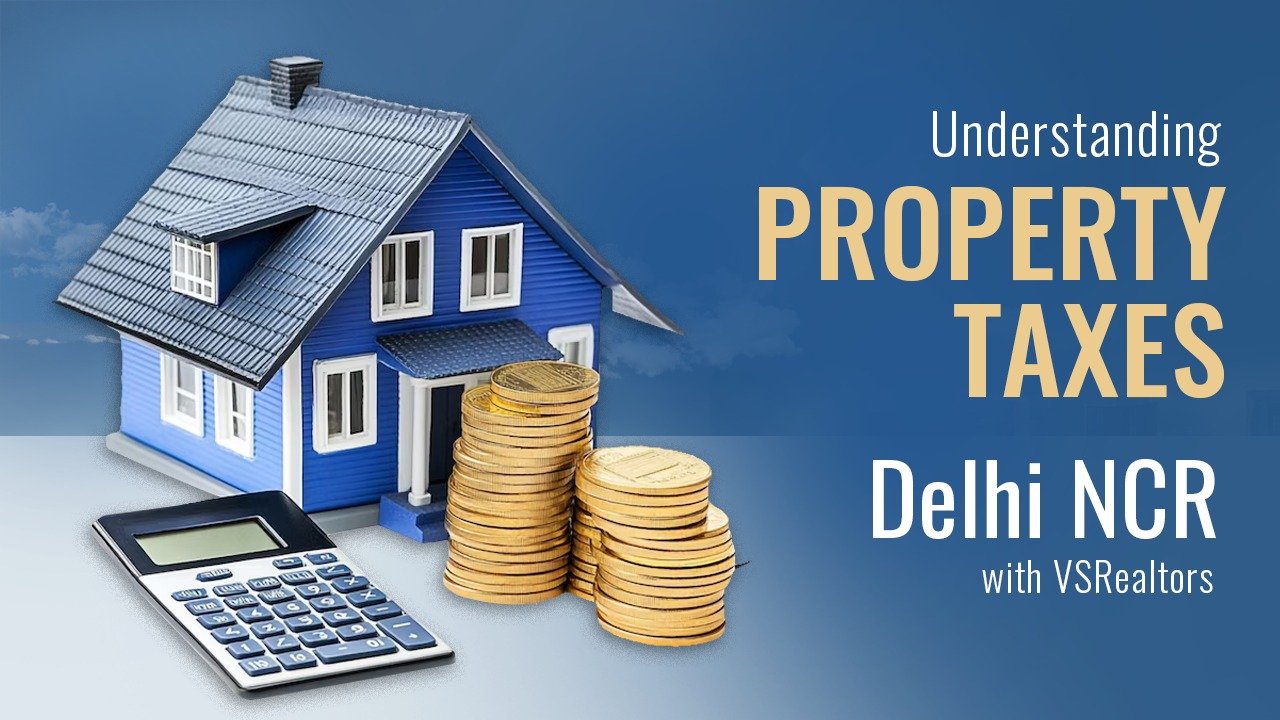Buying property is one of the biggest financial decisions in most of our life. Whether it is a modern apartment, villa, or any commercial space it is important to understand the property taxes. These taxes are a fixed amount that owners have to pay to their local governing body, in this case, Delhi and NCR regions have different governing bodies, and according to them, their taxes are different.
Taxes mainly depend on two things: the local governing body and municipal corporation and the type of property such as residence, commercial, and industrial. VS Realtors will help you understand these property taxes and types which will help you manage your assets and choose the right property for you.
For those who are looking to buy any property in the region, understanding property taxes in Delhi NCR can help you to plan according to and calculate what factors influence the rate is essential for property owners to ensure compliance and avoid penalties. Below we have discussed in depth how will you navigate the complexities of property taxes in Delhi NCR with ease.
How do Property Taxes Work?
Property tax is the subsequent amount charged by a local government against a property holder on properties situated in that district. The total tax amount is proportionate to the actual worth of the property as measured at a point in time.
These property taxes form a major source of income for municipal bodies in India and help fund crucial public services, including schools, road maintenance, water supply, waste management, maintenance, and fire protection. It contributes to community infrastructure development and enhancement. Primarily, property taxes apply to immovable assets such as land and buildings. However, in some cases, local governments can also extend to movable properties, like vehicles or specific types of industrial equipment.
When talking about understanding property taxes in Delhi NCR, the homeowner should know the unique tax structures and rates prevailing in the region. These rates are guided by the municipal guidelines, taking into account properties based on their location, circle rates, and property type. Knowing this information keeps you aware of the finances and also allows them to make the best planning for financial responsibilities.
Understanding Property Taxes in Delhi NCR & How They Are Calculated
As we above known that property taxes are determined based on the annual value of the property and vary across different categories. The NCR region is divided into eight property tax categories which range from A to H and every category has different tax rates for residential, commercial, and industrial properties.
Here’s a breakdown of the tax rates for each category:
- Properties in high-value areas
These come in the A and B categories would fetch high tax rates. Taxation of residential properties in this bracket will be 12%, while commercial 20% and 15% for the industrial property.
- Property in mid-range areas.
These come in the C, D, and E categories which will fetch a little less taxation at 11% for residences and will be commercial at 20% and industrial at 12%.
- Property in low-range areas
The F, G, and H categories properties have compatible lowest property taxes, for residential would have a tax rate of 7%, 20% tax for commercial, and 10% for industrial properties.
| Categories | Residential Property Rates | Commercial Property Rates | Industrial Property Rates | Unit Rate per sq. meter |
| A | 12% | 20% | 15% | 630 |
| B | 12% | 20% | 15% | 500 |
| C | 11% | 20% | 12% | 400 |
| D | 11% | 20% | 12% | 320 |
| E | 11% | 20% | 12% | 270 |
| F | 7% | 20% | 10% | 230 |
| G | 7% | 20% | 10% | 200 |
| H | 7% | 20% | 10% | 100 |
The categorization depends on the circle rate, location, and market value of the property. This ensures that property taxes are collected based on the economic value of the area and that all the property owners pay a fair system. Understanding the categories and the rates they apply to helps in the calculation of taxes and hence financial preparation by the property owners.
Key Points of House Tax in Delhi
To calculate the house tax you should take the systematic approach and the owners should know the local rules and regulations and also pay the amount of tax accurately. Here are a few points to understanding property taxes in Delhi NCR and the process.
- Determine the Unit Area Value (UAV)
The first step involves identifying the Unit Area Value. This is the value of a property based on the location and category of the property. In different areas, and also varying types of property (residential, commercial, etc.), there exist different UAVs, which would reflect the market value of a property in a particular zone.
- Calculate the Annual Value of the Property
After knowing the UAV, multiply it by the total built-up area of your property. The result will give you the annual value of the property, which is a key figure in determining the house tax.
- The Age Factor of the Property
The age of the property is considered in tax calculations. Properties are classified as new, old, or very old. The tax rate may be adjusted according to the age of the property. Older properties tend to attract lower rates because they depreciate over time.
- Deduct Applicable Exemptions
The tax will not apply to properties used for religious purposes or educational institution buildings. The net annual value will be obtained by subtracting all eligible exemptions from the annual value. While paying any of your taxes it is important to understand the tax deductions and exemptions systems. Depending on the property’s use or the owner’s status, some exemptions or rebates may be applicable.
- Application of Tax Rate
After determining the net annual value of your property you can identify the relevant property tax rate based on your property’s category and location. The tax rates vary by zone and the type of property, so be sure to check the specific rates for your area.
- Consider Additional Charges
In addition to the base property tax, be aware of any extra charges that may apply, such as user charges for public services or the education cess, which is levied on property taxes in certain regions. These charges will add to your total liability.
- Check Payment Deadlines and Schedules:
Lastly, one must keep track of the timeline of payments. Property taxes in Delhi are usually paid in one go at the end of the year according to the local municipal corporation. Failing or lagging behind the deadlines would attract charges, so one needs to catch up with the due dates and plan their payments according to them.
By following these steps, property owners in Delhi can calculate their house tax accurately and avoid penalties for non-compliance with local tax regulations.
Understanding property taxes in Delhi NCR or any part can be difficult and require expert help. At VSR we provide favorable property solutions for any of your property needs.


